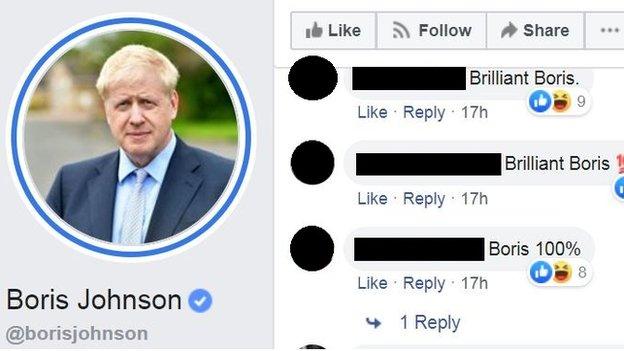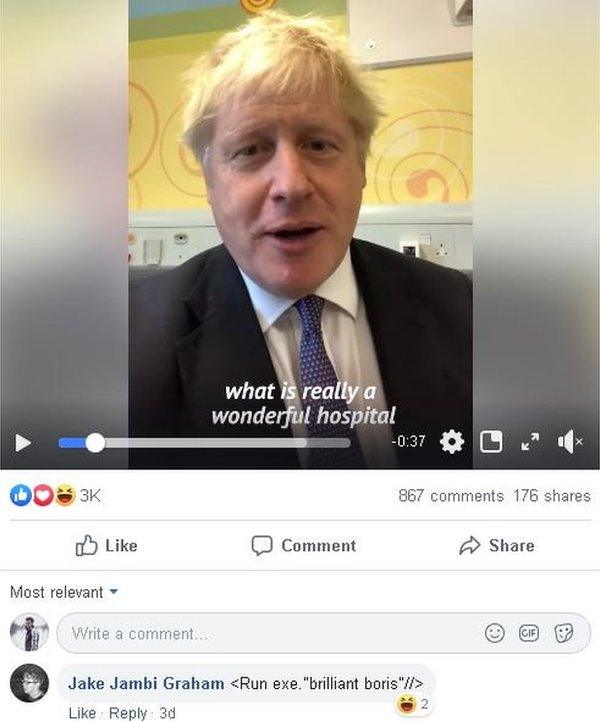The real people pretending to be 'Boris bots' on Facebook
- Published

Just a few examples of the thousands of nearly identical messages being posted to Facebook
Thousands of nearly identical messages of support for Boris Johnson are being posted to Facebook pages.
It's prompted concerns about whether "bots", or automated inauthentic accounts, are being used to try to sway voters.
While bots do exist, the BBC has spoken to real people, both for and against Brexit, who have posted such comments.
They're doing it because they think it's funny - and to try to trick the other side.
What do the messages say?
The bot-like messages say things like "I support Boris 100%" and "Brilliant!". They appear, as above, on the prime minister's own Facebook page, as well as on the pages of news outlets.

There is similar activity on Jeremy Corbyn's official page but it is not nearly at the level as on Johnson's, which is liked by more than 700,000 people.

A number of nearly identical and nearly simultaneous comments on Boris Johnson's official Facebook page
Stranger things
On some Johnson posts something even stranger is going on.
Lots of similar comments have appeared which include odd symbols and characters.

To the untrained eye this looks like a faulty line of code - a broken "Boris bot".
So what's really going on?
Not all bots
Some of the Boris "supporters" might actually be the result of automated activity, although there's no indication that anyone inside the prime minister's campaign is behind it.
William Dance, a linguistics and fake news expert at Lancaster University says Johnson's page shows "signs of inauthentic behaviour, with repetitious and duplicate comments."
But many of the accounts are real people, with fleshed-out authentic-looking profiles.
Why are they flooding social media with spammy messages?
It may have started as a trick.
'Driving Remainers crazy'
Fight4Brexit, external is a page with almost 100,000 members.
John Johnston, a political reporter for Politics Home, spotted last month that this page has been directly encouraging people to post bot-like messages because they are "driving Remainers crazy", external.
The idea, apparently, is to anger anti-Brexit activists by making it appear that a bot army is flooding Facebook.

What about that strange code?
But it appears that the other side caught on - which explains those weird code-like messages.
For example, this tweet was shared more than 3,000 times last week and appears to show a "malfunctioning bot" with the name Dan Bunting.
Allow X content?
This article contains content provided by X. We ask for your permission before anything is loaded, as they may be using cookies and other technologies. You may want to read X’s cookie policy, external and privacy policy, external before accepting. To view this content choose ‘accept and continue’.
But the BBC messaged Mr Bunting and verified his identity. He's a masters student from the UK currently living in Sweden with his partner.
"I am not a bot - it was just a satirical comment," he says.
Mr Bunting told the BBC he supports Brexit, "but not the way it is behind handled".
Real or not real?
Some of those fake "malfunctioning bots" are simply a response to the fake "pro-Boris bots".
But others posting those code-like messages say they're highlighting the presence of fake accounts.

A supposed 'Boris bot' comment on Facebook
The BBC contacted Jake Graham, the person who posted above, who replied quickly to say his message was "just a joke". But it had a serious point.
Mr Graham, from Preston in Lancashire, says he opposes Brexit and that he made the comment to highlight what he thinks is dubious activity on Johnson's page.
"I've followed Boris for years on Facebook since he was Mayor of London and spotted so many comments that looked like bots," says Graham. "I thought I would make one to make it look like my programming had malfunctioned."
Bot or not?
Even if most of the pro-Boris and anti-Boris messages aren't actually posted by bots, that doesn't mean automated campaigns aren't a problem, says William Dance, the fake news expert.
"Facebook has a major bot problem" he says. "In the first quarter of 2019 alone, Facebook removed over 2 billion inauthentic accounts. This is was almost as many takedowns as Facebook has daily active users."
Unfortunately, when actual people pretend to be bots, it's even more difficult to distinguish real accounts from fake ones.
Additional reporting by Marianna Spring
What did you think of this story? Click here to email us., external
Follow BBC Trending on Twitter @BBCtrending, external, and find us on Facebook, external. All our stories are at bbc.com/trending.